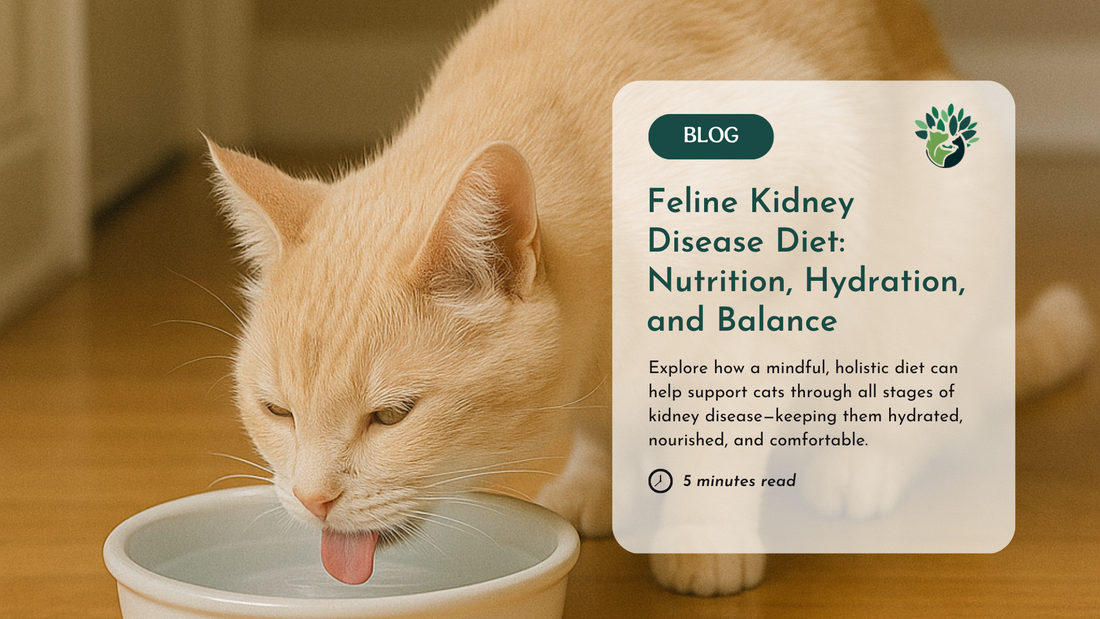Hearing that your cat has chronic kidney disease (CKD) can be deeply emotional. It’s a condition that affects many older cats and requires thoughtful, ongoing support. For years, pet parents were advised to place their cats on very low-protein diets, believing this would “lighten the load” on the kidneys.
However, a growing body of veterinary and nutritional research has revealed a more nuanced truth. While diet absolutely plays a key role in kidney health, the feline kidney disease diet should not focus solely on protein restriction. Cats are obligate carnivores, meaning they depend on animal-based protein for energy and muscle maintenance. Over-restricting protein can actually do more harm than good by causing muscle loss and reducing energy.
A holistic approach to supporting cats with CKD looks at the whole picture, nutrition, hydration, comfort, and overall wellness, rather than focusing on a single nutrient. It’s about helping your cat feel their best, not simply managing lab numbers.
Understanding Feline Kidney Disease Stages
To make the best nutritional choices for your cat, it helps to understand the feline kidney disease stages. CKD typically progresses gradually, and each stage calls for slightly different support strategies.
-
Stage 1–2 (Early CKD): Subtle changes may occur before any symptoms appear. This is an ideal time to focus on prevention and gentle dietary adjustments that support kidney function without drastic restriction. Maintaining hydration and offering fresh, balanced meals can make a difference here.
-
Stage 3–4 (Advanced CKD): As the disease advances, cats may begin to show changes in appetite, energy, or body condition. The focus at these stages shifts toward preserving comfort, encouraging eating, and preventing muscle loss.
Understanding your cat’s CKD stage helps you make informed, compassionate choices about diet and daily care. Remember, no two cats are alike — what matters most is finding what keeps your cat eating, hydrated, and content.
Why Phosphorus Control Matters
One of the most important factors in supporting cats with kidney disease is phosphorus management. Studies have shown that excessive phosphorus levels in the diet can contribute to the worsening of kidney function over time.
This doesn’t mean every cat needs a phosphorus-free diet — but keeping levels moderate and balanced can help protect the kidneys from unnecessary stress. Pet parents can support this by:
-
Choosing foods naturally lower in phosphorus (for example, certain types of fish or poultry)
-
Avoiding high-phosphorus ingredients like organ meats or bone meal
-
Checking with their veterinarian about suitable diet options
Phosphorus balance is often considered one of the most effective nutritional strategies for cats with CKD. When combined with high-quality ingredients and proper hydration, it forms the foundation of a thoughtful feline kidney disease diet.
Protein Quality: Nourishment Over Restriction
Protein often becomes the most debated topic in feline kidney health — but the goal isn’t to eliminate it, it’s to improve its quality.
Cats rely heavily on protein to maintain lean body mass and metabolic health. When protein intake is too low, their bodies begin breaking down muscle tissue for energy. This can lead to sarcopenia, or muscle wasting, which is linked to decreased strength, immune function, and vitality.
A holistic approach encourages moderate amounts of high-quality, easily digestible proteins rather than harsh restriction. Consider these tips:
-
Opt for fresh or lightly cooked animal proteins such as chicken, turkey, or rabbit.
-
Avoid heavily processed or filler-based foods that contain low-grade protein sources.
-
Feed meals your cat enjoys — appetite is often the first challenge in CKD, so palatability matters as much as nutrition.
When cats eat well and maintain muscle tone, they often show more energy, better mobility, and a stronger appetite. Supporting their natural carnivorous needs — within balanced limits — can be one of the most rewarding parts of caring for a cat with kidney disease.
Hydration for Kidney Support
Hydration plays a critical role in supporting kidney health. Cats naturally have a low thirst drive, which makes them prone to mild dehydration, especially if they primarily eat dry kibble.
For cats with CKD, moisture-rich diets are one of the simplest yet most effective ways to promote kidney comfort. Switching from dry food to gently cooked or wet meals increases water intake and helps the kidneys flush out waste more efficiently.
Here are a few hydration-friendly ideas:
-
Offer wet or gently cooked meals as a daily staple.
-
Add a little warm water or low-sodium broth to meals to make them more appealing.
-
Use pet water fountains to encourage drinking — many cats prefer running water.
Staying hydrated helps maintain overall wellness and supports every organ system, not just the kidneys.
A Holistic Perspective on Feline Kidney Wellness
A truly holistic approach to feline kidney disease diets means considering your cat’s entire lifestyle, not just their food.
Cats with CKD often benefit from routines that promote both physical and emotional comfort. Small environmental adjustments — such as soft resting areas, low-stress feeding times, and quiet spaces — can make a big difference in their well-being.
Pet parents can also support their cats by:
-
Encouraging gentle daily activity to maintain muscle tone
-
Keeping meals warm and aromatic to stimulate appetite
-
Maintaining a consistent feeding schedule for predictability
-
Working closely with their veterinarian for ongoing monitoring and guidance
Holistic care isn’t about replacing medical advice — it’s about enhancing your cat’s quality of life through awareness, compassion, and balanced nutrition.
Conclusion: Nourishment, Balance, and Love
Supporting a cat with kidney disease is a journey of understanding and care. There’s no single “perfect” diet, but there are guiding principles that help your cat feel more comfortable and nourished.
By focusing on hydration, phosphorus balance, and high-quality protein, you can create a feline kidney disease diet that supports your cat’s unique needs through every stage. Add to that a peaceful home environment, gentle routines, and lots of affection, and you have the foundation for a holistic, loving approach to feline kidney care.
The goal is not simply to manage a condition, but to help your cat live each day with comfort, joy, and connection, because every moment shared with them is a gift worth cherishing.
Ready to Support Your Cat’s Kidney Health Naturally?
If you’re looking for personalized guidance on nutrition, hydration, and overall wellness, explore our Kidney Support Protocol, a gentle, holistic approach designed to help you make confident choices for your cat’s well-being.
You can also book a consultation with a Holistic Pet Health Coach to receive tailored diet advice and step-by-step support specific to your cat’s stage and lifestyle.
Prefer to start at home? Get The Original CrockPet Diet™ Recipe, which includes a specially designed recipe for kidney support, plus guidance on balancing nutrients the holistic way.
Give your cat the care, nourishment, and love they deserve — naturally.















